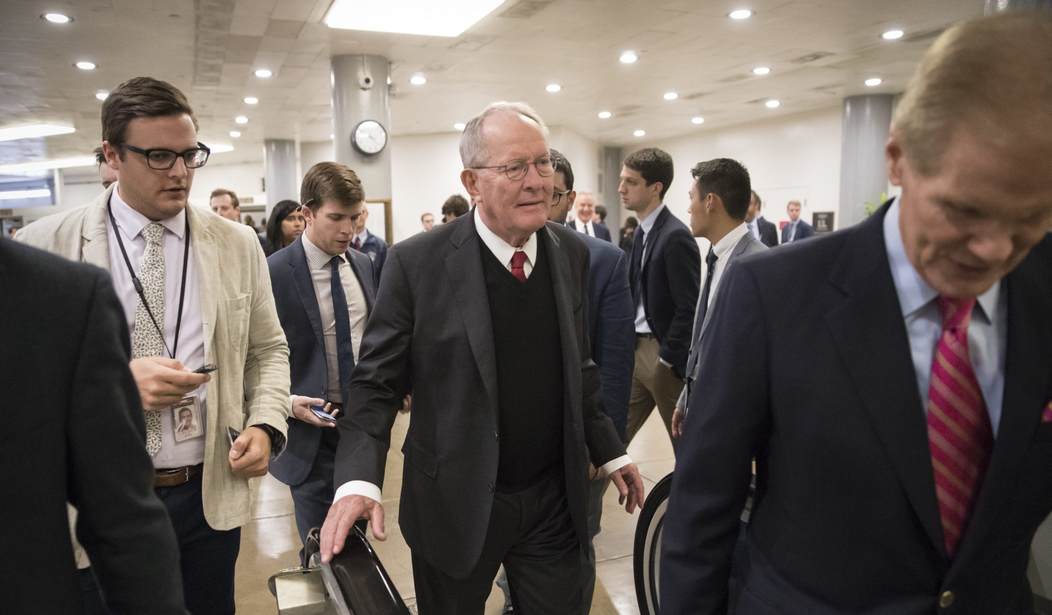WASHINGTON — Despite lukewarm reactions from President Trump this week, Senate Health, Education, Labor and Pensions Committee Chairman Sens. Lamar Alexander (R-Tenn.) said Thursday he has the support of at least a 11 Republicans, not including his vote, to save Obamacare subsidies.
The White House announced last week that the Department of Health and Human Services concluded “there is no appropriation” for the subsidies, and “in light of this analysis, the government cannot lawfully make the cost-sharing reduction payments.”
Trump characterized the move as cutting off “a subsidy for insurance companies.” Democrats slammed the move as a cruel swipe at lower-income Americans and cited Congressional Budget Office estimates that cutting off the payments will cause premiums to shoot up 20 to 25 percent.
Alexander and HELP Committee Ranking Member Patty Murray (D-Wash.), who had already been working together behind the scenes on an agreement to fix Obamacare, unveiled their deal to save the CSR payments through 2019 and open up states’ options for insurance plans within the minimum coverage guidelines.
“Our agreement permanently amends the Affordable Care Act to give new flexibility for states to create insurance policies that have a larger variety and lower costs and it continues the cost-sharing reduction payments during 2018 and 2019,” Alexander said on the Senate floor. “Cost-sharing reduction payments are subsidies that pay for copays and deductibles for low income Americans. Every Republican in the House of Representatives who voted to repeal and replace Obamacare this year, voted for a provision that continued the cost-sharing payments for two years.”
“The president says there should be no bailout of insurance companies. I agree 100 percent. So does Senator Murray,” he added. “We have a page and a half to make it clear that insurance companies cannot ‘double dip,’ so the benefits go to consumers not insurance companies.”
The day before Alexander’s remarks, Trump tweeted: “I am supportive of Lamar as a person & also of the process, but I can never support bailing out ins co’s who have made a fortune w/ O’Care.”
“Some conservatives object to the idea of paying them at all, but I would ask what’s conservative about unaffordable premiums?”Alexander continued. “What’s conservative about $194 billion of new federal debt? What’s conservative about creating chaos so millions can’t buy insurance? What’s conservative about a four-lane highway that would be the chaos that leads to a single-payer solution for insurance in this country?”
“The people still objecting are listening to the groups around Washington, D.C. I would suggest they listen to some other people. Listen to the waitress, listen to the songwriter, listen to the brick layer, listen to the small businesswoman. The people of America, there are 350,000 in Tennessee, who may be terrified by the prospect of increasing premiums or even the prospect of not being able to buy insurance at all,” the Tennessee Republican said. “We haven’t moved an inch toward our objectives in the last seven years of giving states more flexibility in creating insurance policies in the individual market. This agreement does.”
“We have a solution here. Senator Murray and I – a total of 24 United States Senators – are offering it today.”
Republicans who have signed on to the bipartisan agreement include Sens. Mike Rounds (R-S.D.), Lindsey Graham (R-S.C.), John McCain (R-Ariz.), Bill Cassidy (R-La.), Susan Collins (R-Maine), Joni Ernst (R-Iowa), Lisa Murkowski (R-Alaska), Chuck Grassley (R-Iowa), Johnny Isakson (R-Ga.), Richard Burr (R-N.C.), and Bob Corker (R-Tenn.).
They join Sens. Angus King (I-Maine), Jeanne Shaheen (D-N.H.), Joe Donnelly (D-Ind.), Amy Klobuchar (D-Minn.), Heidi Heitkamp (D-N.D.), Al Franken (D-Minn.), Joe Manchin (D-W.Va.), Tom Carper (D-Del.), Tammy Baldwin (D-Wis.), Claire McCaskill (D-Mo.), and Maggie Hassan (D-N.H.).
Murray said that “the law is very clear that these payments are required — but with the president’ s decision to stop them families are looking to Congress and this administration and asking what we plan to do.”
“So I am glad that both Democrats and Republicans agreed that we needed to act — and that we could do much better working together, under regular order, than doubling down on partisanship and dysfunction,” she said. “As a result of the hard work of Chairman Alexander and members of our health committee, and with the input of half the Senate, we’re able today to put forward an answer: a bipartisan solution that prevents families from paying the price for sabotage and uncertainty — one that members on both sides of the aisle can be proud to support.”









Join the conversation as a VIP Member